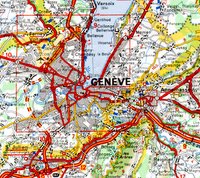
Perhaps a mildy rose-coloured view of the US's intentions, but an interesting read nonetheless...
February 06, 2006, 9:29 a.m.
Sins of Commission
The U.S. should not pretend that the draft for a reformed U.N. human-rights body is any improvement.
Secretary of State Condoleezza Rice is facing one of the hardest choices yet in her multilateralist career. United Nations members are poised to adopt a new primary U.N. human-rights body to replace the discredited Human Rights Commission. Negotiations on the last draft, released February 2, start today (Feb. 6). As it now stands, U.N. members would create a body far worse than its predecessor, but the push is on to make the United States out to be an isolationist spoiler if the administration objects.
Ambassador John Bolton has been keeping his finger in the dike for months. "We want a butterfly," he said. "We're not going to put lipstick on a caterpillar and declare it a success." But even the caterpillar is looking good compared to the New York City roach now on the table.
It all started in September. Misrepresentation number one came from Secretary General Kofi Annan. After a September confab he declared that the summit had "made real progress on...human rights..." and that "the detailed language [on the Human Rights Council] developed in the lead-up to the Summit...enjoyed the support of the overwhelming majority of Member States."
Ever since, member states have been fighting it out to come up with the minimum common denominator that can be sold to the naïve or illiterate as a "new" Human Rights Council.
Democratic U.N. members sought to reduce significantly the numbers on the council as a means of minimizing the chances of electing the worst human-rights abusers. The draft makes the earth-shattering change from 53 members to 45. A second idea was to have the council meet more often. The draft calls for a minimum of ten weeks per year, which represents an additional four weeks from the current term, and potentially even sessions year-round. But in the U.N.'s own inimitable fashion, meeting time has become an end in itself, since more may well be less given the remainder of the draft.
Out with the West
The proportionate number of members will be changed to reflect more accurately geographic distribution. This means the overall representation of Western states will be reduced and the representation of Asian states will increase. Forty-four percent of the members of the Asian regional group are members of the Organization of the Islamic Conference. Given that many initiatives of democratic states at the commission pass by only one or two votes, this redistribution is a major blow.
The reduction of Western seats is coupled with the absence of any criteria whatsoever for membership. On the contrary, the draft says explicitly that membership "shall be open to all Member States of the United Nations." In a laughable addition, it goes on to suggest that "when electing members of the Council, Member States shall take into consideration the candidates' contribution to the promotion and protection of human rights and the voluntary pledges and commitments made thereto [and]...whether there are any situations that constitute systematic and gross violations of human rights or any agreed measures currently in place at the United Nations against a candidate for human rights violations." In other words, the solution to a commission that currently includes China, Cuba, Saudi Arabia, Sudan, and Zimbabwe is to beg countries in the future to please consider their human-rights record.
What happened when an exhortation was made in November 2005 at the U.N. General Assembly for states to consider Sudan's human-rights record and adopt a resolution condemning atrocities in Sudan? The resolution failed, as the U.N. majority rallied to Sudan's side. The commission has never adopted a single resolution in over 40 years criticizing human-rights violations by China, Saudi Arabia, or Zimbabwe. On such countries there are no "agreed measures currently in place...for human rights violations."
The United States — which bears 22 percent of the costs of the commission — has been a member of the commission since it began, with the exception of 2002. But the new draft will require all countries to go off the council after two consecutive terms. New and improved, U.N.-style, means a lot less contribution from the United States to the international promotion and protection of human rights — while keeping the dollars flowing of course.
The U.N. has had innumerable conferences and meetings related to human rights. Many end in pronouncements which masquerade as consensus despite serious disagreements, or are products of subsets of U.N. members because of their objectionable content. Over the years, there has been a never-ending U.N. game of ignoring reservations or lack of universal agreement in an attempt to raise the status of the outcomes of these meetings to the level of binding international law. The council draft takes this maneuver to shocking new heights. It requires council members to "promote...the follow-up of the goals and commitments related to the promotion and protection of human rights emanating from United Nations conferences and summits." Given there is no exception, the United States will now be required to promote follow-up to such U.N. conferences as the 2001 Durban Racism Conference (which the United States left in disgust), and the 1978 and 1983 U.N. World Racism Conferences which preceded it. The 1978 conference "proclaims its solidarity with the Palestinian people in their struggle for liberation and against racial discrimination" while concerned about "the insidious propaganda by the Government of Israel and its zionist and other supporters..." Hamas will be pleased.
Also scattered throughout the proposal are references to the "right to development," repeatedly singled out either as a human right of special importance, or as a distinct right worthy of respect equal to that given to any human right. In addition, there are numerous calls for "cooperation and dialogue," included in an effort to stymie condemnation of particular human-rights abuses.
Another idea in the draft, supposedly meant to scare the world's bullies and despots from running for election, is "peer review." An examination of local human-rights conditions will be conducted during the tenure of all council members (and later for every U.N. state). But peer review will take place only after the election. A requirement that the review conclude with a public report — which made it into an earlier version — has been deleted. No one could seriously believe that the likes of such states as China and Cuba, which unabashedly characterize themselves as democracies, will be inhibited from submitting their candidacies because of "peer review".
One of the only remaining items still undecided is the issue of whether members must be elected by a two-thirds majority, or a simple majority as is now the case. Some believe that a larger majority will operate to keep off the worst offenders. It is typical of U.N. negotiations that attention is diverted in this way from the real failure, namely, the lack of membership criteria. Voting must result in a specified geographical distribution, and the U.N.'s five regional groups will be able to put forward internally agreed slates which would satisfy their regional quotas. This will make it very difficult, though not impossible, to reject the only candidates put forward for regional slots. Furthermore, the so-called "Group of 77 and China," an alliance operating within the U.N. which today numbers 132, or 69 percent of U.N. members, has the requisite two-thirds to elect any state it chooses. Under the two-thirds criterion it is far more likely that the United States will fail to be elected than China.
There is also a telling omission from the draft. Israel is the only U.N. member state left standing in the halls from 9 A.M. to 10 A.M. every day of a U.N. Human Rights Commission session. It is excluded from full membership in a U.N. regional group and is therefore not permitted to attend the important negotiating and information-sharing meetings which take place every morning. Even non-members like "Palestine" and the Holy See can attend, but not the Jewish State. In the draft, pains are taken to include all kinds of other entities in the council deliberations, but there is no insistence that this egregious discrimination against Israel come to an end.
"Shouldn't settle for window dressing"
In sum, this U.N. Human Rights Council is a disaster. Acquiescence will mean that the political will, however meager, resulting from almost universal admission that the system was discredited, will have been squandered. At the same time, if the United States agrees to this charade and becomes one of its architects, the ability of future U.S. administrations to reject its machinations will have been sabotaged.
No doubt American objection will be subject to the predictable outcry that it is Ambassador Bolton's fault, just as it will be his fault when the experiment of such a Council fails. Indeed, the campaign to put lipstick on the cockroach has already started. Human Rights Watch spokesperson Peggy Hicks commented on February 3: "The new text substantially advances the discussion and gives a good basis to achieve a stronger human rights council, assuming there is a decision to have members of the council elected by a two-thirds majority." February 3rd's New York Times headline reads "With Its Human Rights Oversight Under Fire, U.N. Submits a Plan for a Strengthened Agency."
The Rah-rah U.N., Boo Bolton rallying cry, however, has one major impediment — it is diametrically opposed to the alleged raison d'etre of a new human-rights body supposedly championed by the very same critics. A New York Times editorial of January 10, 2006, said: "The problem with the current discredited Human Rights Commission is that its members are chosen by a system of regional rotation that fails to take into account the actual human rights performance of prospective members...Some of the people most in need of a strong U.N. voice on human rights live under tyrannies that have carefully cultivated Chinese or Russian favor: Cuba, Iran, Myanmar, Uzbekistan and Zimbabwe, to name a few." Absolutely nothing in their so-called "plan for a strengthened agency" addresses the system of regional entitlements, ensures account is taken of the actual human rights performance of prospective members, or prohibits any of these states from being elected all over again.
On January 1, 2006, Peggy Hicks of Human Rights Watch was reported as saying "the presence of abusive countries on the commission...end[s] up weakening action on human rights abuses worldwide." Absolutely nothing in the draft, characterized by Hicks as a "good basis to achieve a stronger human rights council," prevents the presence of these abusive countries in the future. Kenneth Roth, executive director of Human Rights Watch apparently "shares Bolton's assessment that the United States 'shouldn't settle for window dressing.'" These poor fellows are now torn between the usual sycophantic treatment of the U.N. and the unsightly naked emperor standing in the window.
That brings us back to Condoleezza Rice. Will the United States play the same game? Will the desperate search for multilateral friends in this and other contexts result in an attempt to convince members of Congress that the new U.N. Human Rights Council is a real gain? Perhaps Congress should schedule hearings on the new draft, or invite State Department representatives to explain the current situation immediately, before it's too late. We have reached the nub of the incapacity of the U.N., with a membership composed primarily of states which are not fully democratic, to meet the challenges of democratization and human-rights protection in the 21st century. Short-term and superficial camaraderie is not worth the price of pretense triumphing over principle.
— Anne Bayefsky is a senior fellow at the Hudson Institute and at Touro College Law Center. She is also editor of www.EyeontheUN.org..












